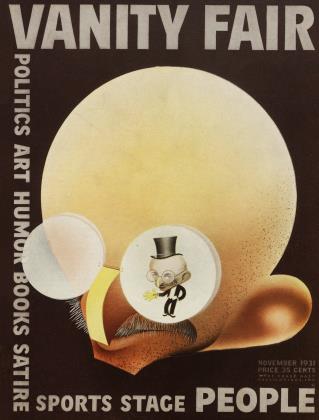Sign In to Your Account
Subscribers have complete access to the archive.
Sign In Not a Subscriber?Join NowManhattan weird
MORRIS MARKEY
THE WIDOW'S NIGHTMARE—A woman who was about sixty years old, dressed in black, came out of a Fifth Avenue shop. She had instructed her chauffeur to call for her at just this moment, but he was nowhere in sight. The crowds were confusing, for she was used to the companionship of a friend or a servant in crowded places, and she was angry with the chauffeur for his failure to appear. As she stood, wondering whether to return to the shop, a man paused very close to her and asked for the time. With mechanical movements, and hardly aware of his presence at all, she opened her bag. She glanced at her watch, and told him that it was almost noon.
He walked on, and she decided to take a taxicab. She had called a driver to the curb and was about to step in, when two men touched her lightly but firmly on the arm, and one of them said sharply, "Let me have that pocketbook." He was a tall, heavy fellow with a serious and forbidding face.
She thought it utterly preposterous that she could be held up and robbed in the midst of all that throng, and she spoke sharply to the driver of the cab. "Take me away at once," she said, and attempted to enter the cab. But one of the two men took her pocketbook from her hands, and the other leaned over to speak to the driver. The driver slammed the door, grinned, and drove away.
For some reason she could think of nothing to say to them as they fumbled slowly through her pocketbook. They were staring at her coldly, holding her arm firmly but not tightly enough to be painful. She was suffused with the sense that an evil dream had come upon her. She saw a policeman directing traffic, but he was many yards away and his back was turned. Hundreds of people were passing, but none paid the slightest attention.
A tall man, carelessly dressed and swinging a cane, was moving toward them along the sidewalk. As he drew close, she gained his attention with a little cry, and when he paused she spoke more clearly than she would have believed possible. "Please help me," she said. "These men are robbing me." The tall man frowned and immediately grasped one of the men by the shoulder. But the man whom he had seized did not show concern. He leaned toward the tall man, murmured something in a low voice, and the latter turned quickly away to move off into the crowd.
Once or twice, men paused and looked, and seemed about to help her. But one of those who held her prisoned spoke quietly, and they vanished. Her molesters were talking inaudibly between themselves, still holding her arms, and peering into the pocketbook.
Mistily now, as in a dream, she saw them put her money and her watch back into the purse. She saw them put the purse back into her hands, and she saw them turn, as if with offended dignity, and walk away.
This irrational ending was, indeed, the most dreadful thing of all, for it took all semblance of actuality from the encounter. Then a policeman came past, and with stumbling words she made him understand. There, she pointed, were the two men, just at the end of the block. The policeman hurried after them. As she watched him go, anger began to conquer her dismay, and her confused thoughts told her that some sensible explanation would come at last. But she saw the policeman speak to the two men, laugh suddenly, look back toward her for a moment, and walk with the two men into the thickest of the crowd.
She, whose name was bright with age— whose husband had been a man of consequence when he lived! She, whose son was director in a dozen companies! An overpowering weakness assailed her, but she gathered strength to call another taxicab and to give the number of her house. . . .
At police headquarters they told her son that the detectives had observed her brief encounter with a known drug addict—the fellow who asked her for the time—had watched her open her bag with what seemed to them a surreptitious gesture, and had assumed that she was a vendor of narcotics.
 View Full Issue
View Full Issue












Subscribers have complete access to the archive.
Sign In Not a Subscriber?Join Now